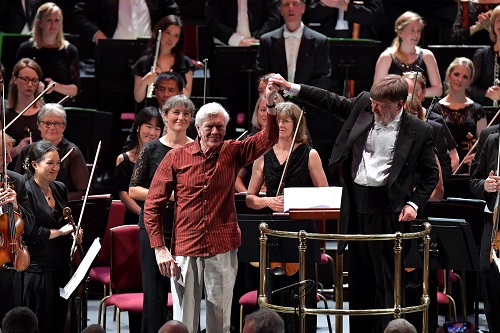
 United Kingdom Prom 15 – Tchaikovsky, Anthony Payne, Bruch, Vaughan Williams: Ray Chen (violin), BBC Symphony Orchestra and Chorus, Sir Andrew Davis (conductor), Royal Albert Hall, London, 26.7.2016. (CST)
United Kingdom Prom 15 – Tchaikovsky, Anthony Payne, Bruch, Vaughan Williams: Ray Chen (violin), BBC Symphony Orchestra and Chorus, Sir Andrew Davis (conductor), Royal Albert Hall, London, 26.7.2016. (CST)

(c) Chris Christodoulou
Tchaikovsky – The Tempest, Op 18
Anthony Payne – Of Land, Sea and Sky (BBC Commission – world premiere)
Bruch – Violin Concerto No 1 in G minor
Vaughan Williams – Toward the Unknown Region
There is always something special about BBC Symphony Orchestra Conductor Laureate, Sir Andrew Davis returning to the orchestra with which only founder Sir Adrian Boult served for longer. And such is the aura of bonhomie that Davis exudes, it is difficult not to sense the palpable respect which is lavished on him by the orchestra’s players.
Yet as the warm applause in the Royal Albert Hall settled, Davis’s beaming arrival on stage was soon transformed into rapt atmosphere as the haunting opening chords of The Tempest set the tone for an intense account of Tchaikovsky’s early orchestral essay. Tchaikovsky’s Opus 18 Symphonic Fantasy might not possess the formal rigour or sophistication of his later exploration of Shakespeare in the Fantasy Overture Romeo and Juliet, but it is nonetheless a work of potent atmosphere and deft orchestration, laced with attractive themes that whilst occasionally sounding very close to Borodin, also pre-echo the sparkling orchestration that was to be the hallmark of Nicolai Rimsky-Korsakov.
From the early flickering interjections of the woodwind to the burnished sound of the brass, Davis’s account, directed characteristically with no baton and a strikingly expressive use of his hands, was one that took full advantage of the rich opportunities for orchestral colouring lavished on the score by the composer, with the strings ravishingly rich sonority burning through in the intensifying love theme that marks the blossoming of Miranda and Ferdinand’s relationship and a luminous lightness of orchestral touch in the swift ensuing scherzo. Davis’s masterful pacing combined with the enveloping darkness of the closing paragraphs contributed to a compelling performance, perfectly in tune with the magical aura of Shakespeare’s atmospheric theatrical creation.
At the age of 80, Anthony Payne is arguably one of the grand old men of British music, although one wouldn’t have though so given the lithe way in which he skipped down the steps onto the stage at the conclusion of the world premiere of his BBC commission, Of Land, Sea and Sky. On one level it is perhaps unfortunate that Payne is best known for his elaboration and completion of Elgar’s Third Symphony rather than the body of original work that he has slowly built up over the years. It is a catalogue that although modest in size is nonetheless carefully and skilfully crafted.
Of Land, Sea and Sky closes a gap in that catalogue, being Payne’s one and only essay employing orchestral and choral forces and taking as its inspiration a series of ‘natural illusions’, triggered by a film of the white horses of the Camargue, galloping over the flats of the Rhone estuary as if ‘running on water’. Payne adds to that magical image a series of other natural illusions including a giant tsunami, clouds appearing to ‘give birth’ and smoke over a battlefield on the Somme. Weaving these and other images into a convincing symphonic cycle of six continuous movements, Payne paints in evocative orchestral and choral colours, the surface orchestral activity often being underpinned by lush, resonant string harmonies that point to the fact that Payne has always found it difficult to completely abandon tonality.
What emerged was a work rich in atmosphere with a strong sense of symphonic structure, although one in which the carefully created transparency of the scoring and textures was arguably more memorable than the thematic material itself. As is so often the case, this is music that would benefit from repeated listening to reveal its hidden nuances whilst also pointing to what should be a deserved re-appraisal of earlier Payne works including The Spirit’s Harvest (1985) and Time’s Arrow (1990).
There can be a fine line between showmanship crossing the boundary into the realms of histrionics for their own sake, a phenomena with which classical music has become sadly afflicted in the modern age. And at first sight, there is no doubt that Proms debutante Ray Chen possesses those traits of showmanship in no small measure. Born in Taiwan but raised and educated in Australia, Chen cuts a dashing figure; slim, elegant and immaculately groomed, even manicured, his physical stance, movement on the stage and often extravagant bow gestures demonstrate a player of unbridled confidence that oozes presence and charisma.
Yet within minutes of taking to the platform, it quickly became clear that it was Chen’s breathtaking technique and pristine musicianship rather than his personal attributes that had the Albert Hall audience eating out of his hand. It is no mean feat to breathe new life and spirit into a concerto as familiar as Bruch’s Violin Concerto No. 1 in G minor, yet Chen succeeded in doing just that, finding intense drama and impressive commitment in the opening movement and playing of sweetly intoned pathos and touching sensitivity in the central Adagio.
By the time he reached his full stride in the dashing virtuosity of the Finale in which the crystalline clarity of his upper register was matched by a richly glowing lower register, Chen’s winning formula had already hit home, before he delighted the audience with a breathless encore of Paganini’s Caprice No. 21.
Sir Andrew Davis is a conductor of unquestionable heritage when it comes to the music of Vaughan Williams, a fact borne out by his fine cycle of VW Symphonies with the BBC Symphony Orchestra. That heritage proved to be very much to the fore in the richly expansive account of Toward the Unknown Region that brought Prom 15 to a close. As the thematic ebb and flow of the music evidences, the text of Walt Whitman is not the only connecting factor between VW’s first major choral orchestral work and the Sea Symphony, on which the composer was working at the same time. But unlike the vast canvas that is the first of VW’s symphonic essays, Toward the Unknown Region is immediately satisfying in its taut, thematically cohesive twelve minute duration.
From the gloriously intoned brass chorale and the slow, certain tread of basses at the opening, Davis and his forces gave the music a powerful sense of emotional breadth, with the magnificent entrance of the organ towards the close leading to a spiritually affirmative statement of the concluding paean of praise, aided in no small part by the stirring sounds and vocal clarity of the BBC Symphony Chorus.
With Sir Andrew Davis in his element, Vaughan Williams’s early masterpiece made for a stirringly uplifting conclusion to a Prom of fascinating contrasts, whilst introducing a violinist of rare charisma and abundant musicianship to a vocally appreciative Proms audience.
Christopher Thomas